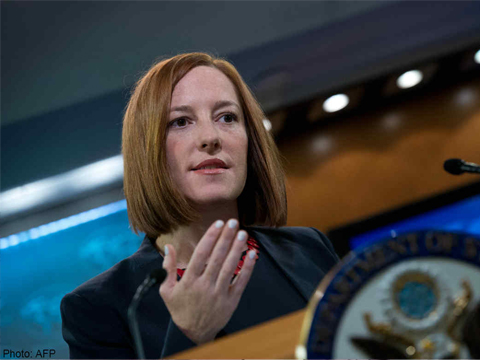Psaki proves Armenian minister wrong

By Mushvig Mehdiyev
The Armenian foreign ministry appears to apply a new method in its code of conduct in relations with foreign colleagues. Falsification here turns to be a "smart" addition to the ministry's activity given the tense developments in the region these days.
As the South Caucasus region finds itself focused on the resolution of the complicated dispute in between Armenia and Azerbaijan over the two Azerbaijani hostages, Armenia continues to defy international law. With all due respect, Armenia's position on the return of captives to Baku does not fit calls from the international community interested in developments in the region, particularly the Nagorno-Karabakh conflict's settlement.
The U.S. and Russia, co-chairing countries of the OSCE Minsk Group, a mediator structure involved in the conflict's resolution, has consecutively revealed their advocacy for the release of the two Azerbaijani hostages.
Three Azerbaijanis - Hasan Hasanov, Dilgam Asgarov and Shahbaz Guliyev - were captured in the Shaplar village of Azerbaijan’s occupied Kalbajar district on July 11, 2014 by the Armenian special forces.
Hasanov was reported killed after enduring brutal torture.
Asgarov and Guliyev were judged in a show trial in the occupied Nagorno-Karabakh region and subsequently sentenced to life in prison and 22 years imprisonment respectively on trump up charges.
Jane Psaki, spokesperson for the U.S. Department of State, said on February 25 that the U.S. has supported through OSCE Minsk Group Co-Chair, James Warlick the release of the two Azerbaijani hostages held by the separatist authorities in the Nagorno-Karabakh region. It was, in fact, the official position of the White House, according to Psaki.
Nevertheless, the Armenian media reports on February 26 said Foreign Minister Edward Nalbandyan stated that none of the OSCE Minsk group co-chairs have called for the release of Asgarov and Guliyev.
Nalbandyan's statement emerged as an attempt to cast a shadow on the accuracy and seriousness of the U.S. foreign policy. He, indeed, put Armenia's foreign policy at a head lock with the U.S.
Armenian foreign chief's denial of the representation of the official U.S. position in Yerevan by Warlcik pushed the U.S. Department of State to once more clarify its approach towards the Azerbaijani hostages' case.
In a press statement on February 27, Psaki quashed Nalbandyan's attempts to dismiss her earlier remarks as she officially reconfirmed Warlick's calls to release the hostages in a meeting in Yerevan.
"I believe I was referencing, I think, public comments that were made. So I would point you to that, and I certainly made those calls from here. So those reflect the position of the Department and everybody up in the senior ranks," she said.
Psaki's reiteration of the previous address, indeed, proved the White House's unchanged position on Armenia's illegal capture and judging of Azerbaijani nationals.
The U.S. sees the captives' release as part of efforts to reduce the tension on the line of contact of the Armenian and Azerbaijani armies notwithstanding Yerevan's childish "cat and mouse game" with the Western giant.
Furthermore, prior to Psaki's address, in an interview with a news agency in the so-called "Nagorno-Karabakh republic" Warlick said the release of the two Azerbaijanis could be a positive step for the peace process, according to Azatutyun, a local radio in Yerevan.
Victoria Nuland, Assistant Secretary of State for European and Eurasian Affairs at the U.S. Department of State, was the first U.S. top figure who chided Armenia for its inhuman treatment of the two Azerbaijani captives, expressing serious concerns over Armenia's approach towards the prisoners back in her speeches in Baku and Yerevan in mid-February.
Azerbaijan's internationally recognized Nagorno-Karabakh territory has become a conflict zone following Armenia's aggression in the early 1990s. As a result of Armenia's armed invasion, 20 percent of Azerbaijan's territory fell under Armenia's occupation. Nonetheless, the OSCE has attempted to foster a peaceful resolution to this conflict amid Armenia's persistent derailment on peace talks.
- - -
Follow Mushvig Mehdiyev on Twitter: @Mushviggo
Follow us on Twitter: @AzerNews
Here we are to serve you with news right now. It does not cost much, but worth your attention.
Choose to support open, independent, quality journalism and subscribe on a monthly basis.
By subscribing to our online newspaper, you can have full digital access to all news, analysis, and much more.
You can also follow AzerNEWS on Twitter @AzerNewsAz or Facebook @AzerNewsNewspaper
Thank you!
